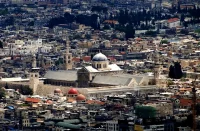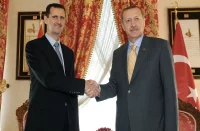Surprising political developments in Israel and recent reports in the US media suggest that Israel will attack Iran in the near future.
After Prime Minister Benjamin Netanyahu announced early parliamentary elections at a conference of the Likud ruling party in early May, Israel decided unexpectedly to cancel them.
The cancellation of the elections was not the bombshell; rather, it was that Likud and the chief opposition party, Kadima, have agreed to form a broad coalition.
Prime Minister Netanyahu and Kadima leader Shaul Mofaz announced at a joint press conference on May 8 that they had agreed the day before to unite their factions in a broad new coalition and form a national unity government instead of holding early elections.
The alliance of Israel’s two largest parties, which are led by Prime Minister Netanyahu and Shaul Mofaz, means that changes are coming that extend beyond Israeli domestic politics.
According to observers in Israel and the United States, the formation of a national unity government is part of Israel’s preparations for war with Iran. Moreover, Pentagon experts believe we can expect the attack to happen this coming September or October, i.e., before the US presidential election. Israel might risk attacking Iran during Barack Obama’s last month in power in hopes that the Jewish community’s influence on the American election would be so strong that a démarche to Israel would pose a serious threat to any American presidential candidate. Obama would have no choice but to support Netanyahu’s decision to attack.
The decision to form the surprising new coalition came virtually the day after Netanyahu said his cabinet does not have enough support in the Knesset, in which a large Kadima faction plays an important role.
Surprisingly, Kadima leader Shaul Mofaz, who joined the coalition and received the post of deputy prime minister, has essentially sacrificed his political career in order to give Netanyahu unprecedented powers to address key domestic policy and national security issues.
Prime Minister Netanyahu is now the leader of the broadest coalition in Israel’s entire 64-year history. The new coalition will hold 94 of the 120 seats in the Knesset.
Mofaz not only sacrificed his personal role in Israeli politics, but also his influence with his party. After all, Mofaz recently called Netanyahu a liar in public and insisted he would never join a coalition with the prime minister. However, his statement at an emergency press conference explains a great deal. He said there are times in the life of a nation when a personal career is no longer important, when unity is more important.
It was truly a strong statement, the kind called for when faced with real challenges. Incidentally, the reasons given for forming the coalition also speak to the military nature of future developments in Israel.
According to Netanyahu himself, the coalition was formed to achieve four main goals — to amend the Tal Law (which exempts Orthodox Jews from military service), pass a budget, reform the system of governance and promote a peace process. At the same time, Netanyahu made no bones about the fact that Iran is one of the new ruling bloc’s most important issues.
Meanwhile, the current government has brought together three former Israeli army chiefs of staff, and they will obviously take a tough stance towards Iran. Ehud Barak, Shaul Mofaz and Bugi Ya’alon all once served in the General Staff’s special intelligence unit; and Barak, who has been in various positions of command over Netanyahu, Mofaz and Ya’alon, has said more than once in his speeches that the only way to solve the Iranian problem is to attack the nuclear facilities.
In addition, Foreign Minister Avigdor Lieberman, whose “Israel, Our Home” Party also takes a tough stance towards Iran, will play an important role in the coalition.
Another thing that makes us uneasy is that immediately after the new government was formed, Israel’s prime minister devoted one day a week to discussions of ways to reinforce the rear and check the readiness of civil defense facilities (bomb shelters and strategic reserve warehouses).
In addition, last week, the new Israeli Air Force commander, General Jonathan Eshel, said that difficult trials are ahead for Israeli pilots. In addition, Maariv journalists say that Ehud Barak and his chief of staff, Yoni Koren, took part in the political consultations to form the national unity government in the Prime Minister’s office in Jerusalem.
White House political analysts also believe that the formation of a national unity government increases the likelihood that Israel will strike Iran’s nuclear facilities.
However, Tehran has decided to anticipate events and has begun openly considering a preemptive strike.
Strange as it may seem, Iran’s plan for a preemptive strike on Israel would be entirely consistent with international law if made in conjunction with certain kinds of diplomatic efforts.
Given Israel’s willingness to attack Iranian nuclear facilities as stated repeatedly by Israeli officials, Iran could justifiably cite the right of preventive self-defense in denying Israel the capability to execute an attack. Resolution 533 of the International Atomic Energy Agency (IAEA) poses an obstacle to attacking Iranian civilian nuclear facilities — it considers such attacks a violation of international law.
Since there is no real evidence that Iran’s nuclear facilities are not intended for civilian purposes, Iran could use it to justify an attack on Israel.
Iran is entitled to defend itself under Article 51 of the UN Charter, considering that Israel has openly stated its intent to attack Iran in the near future and has even requested US support. Tehran could portray recent developments in Israel and threats to its national security, which customary international law defines as “foreign hostile acts” by one state against another.
In addition, Iran could insist that it has completely exhausted diplomatic means, including repeated complaints about Israel to the UN Security Council that have gone unanswered.
All of these facts create a legal precedent supporting a preemptive strike by Iran on Israel. Should that happen, the United States could not remain on the sidelines despite Obama’s obvious reluctance to open another theater of war in the Middle East.
Therefore, it is obvious that the situation is threatening to crystallize into a real military conflict between Israel and Iran with disastrous consequences not just for those countries, but also for the United States and many countries in the Middle East and the South Caucasus.
Source: New Eastern Outlook














Pingback: The Decolonization Of Israel Has Begun – OrientalReview.org – DE LA GRANDE VADROUILLE A LA LONGUE MARGE